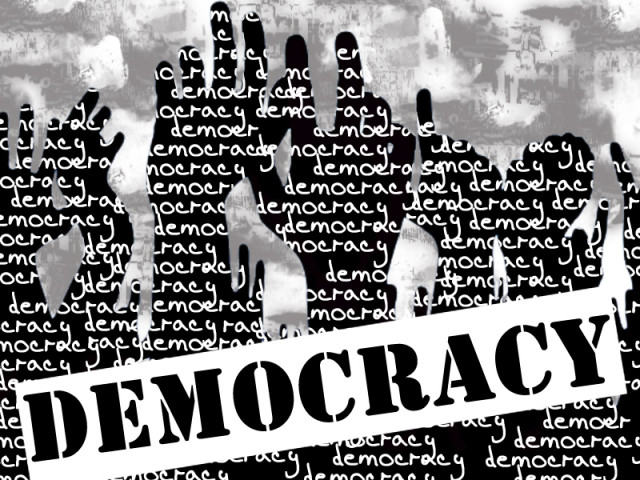Through 10 points, civil society hopes for consensus between political parties
Journalist suggested adding an additional point for disarmament in Karachi.

Civil society prepares a 10-point charter of democracy to develop consensus between political parties. DESIGN: SUNARA NIZAMI
The Centre for Civic Education organised a dialogue session titled ‘Road to Election 2013: Public, Republic and Democracy’ at the Pearl Continental hotel on Tuesday. They invited members of civil society, academia, journalists and students to share their views.
“This is not a final document but a draft, which is open for suggestions,” said the centre’s head Zafarullah Khan. The centre is working to promote citizen’s participation in democratic process with the support of the National Endowment for Democracy, a US-based non-profit foundation dedicated to the growth and strengthening of democratic institutions around the world.
Co-authored by IA Rehman, secretary general to the Human Rights Commission of Pakistan, the charter was forwarded to 18 political parties to initiate dialogue, said Khan, adding that only one of them had acknowledged its importance. The charter, which was prepared in Urdu for its maximum outreach, was read out before the floor was opened for discussion. The language used in the charter, however, requires simplification for everyone to comprehend its suggestions. For instance, abstract sentences such as ‘Pakistani wifaqiyat ka phool faqat numainda parlimani jamhooriat mein hi khil sakta hai’ are bound to boggle several minds.

To open the discussion, Khan contextualised the forthcoming elections as the “first ever civilian-to-civilian transition without the mentoring and monitoring of powers.” While most of the efforts in the past had been to reclaim democratic space, he added, in 2013 the nation will go to polling booths to endorse or reject political parties on the basis of their performance.
Nazir Leghari, editor of daily Jang who was the chief guest at the event, set the tone of the discussion by saying, “There is no option other than democracy and it can only be made better by more democracy.”
On the forthcoming elections, Khan noted that there were a number of developments that inspired the nation’s confidence in the democratic electoral processes. The structure for an independent election commission has been improved through the 18th and 20th constitutional amendments and members of the caretaker government and their family members have been barred from participating in the general elections. “Efforts have also been made to improve and computerise electoral rolls whereas the apex court has also directed the election commission to keep a check on excessive use of money and the role of independent private media,” he added.
The dialogue participants stressed, however, on a vigilant civil society. “The country has a history of troubled elections marred by the abuse of power, the role of intelligence agencies, the influence of money, electoral violence and numerous other forms of manipulations,” said Muhammad Ali Rasheed, who was representing the civil society organisation, Shehri .

The participants were also concerned about the deteriorating law and order situation, particularly in Balochistan, Khyber-Pakhtunkhawa, Karachi and the Federally Administered Tribal Areas. In this context, journalist Hanif Khan requested an additional point for the disarmament of Karachi in the charter.
“Maintaining law and order during the general elections would pose the foremost challenge for the authorities,” said Quetta Press Club president Saleem Shahid. “For all these years, we kept neglecting the concepts of ‘public, republic and democracy’ and ultimately came across this situation.”
The enigma of civil-military relationship that haunts the country since its inception demanded an equilibrium rather than negation of ‘the other,’ said Prof. Dr Khalida Ghous, the former head of International Relations Department at the University of Karachi.
Published in The Express Tribune, March 7th, 2013.



















COMMENTS
Comments are moderated and generally will be posted if they are on-topic and not abusive.
For more information, please see our Comments FAQ